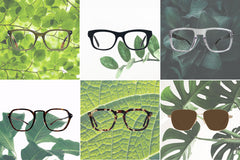Can you really get rid of dry eyes with fish? Let’s talk about that.
Here in Arizona, it’s basically life in the desert. A very dry, hot environment where the temperature can reach 120 degrees. Most people tend to stay indoors in the months of June through September since going outside feels like your face is melting off.
Needless to say, in a climate like this, dry eye is a big problem! So, I’m used to helping my patients battle dry eye.
Here’s the thing, dry eye can be a big problem even if you don’t live in the desert like me. Fortunately, there’s something easy you can do to help your eyes right away.
But first, it’s important to understand why dry eye is such a problem.
Why Is Dry Eye Such a Problem?
Your eyes have to be moist at all times in order to work properly. That’s what your tears are for.
So, when your tear ducts dry up, all sorts of problems appear. This includes eye irritation, redness, stinging, and burning.
The most common way to treat dry eye syndrome is to use artificial tears, or eye drops. However, did you also know that you can also help your dry eye by eating fish?
Yes…that’s right…fish!
Not just any fish, but the fatty kind such as herring, salmon, and mackerel. They are also called oily fish and are the best sources of Omega-3 fatty acids.
These fatty acids contain health benefits for your entire body including your brain, heart, and lungs. They also help slow the progression of plaque formation in your veins and arteries. And, they can also help your eyes.
How Do Omega-3 Fatty Acids Specifically Help the Eyes?
Omega-3 fatty acids help to improve the eyes’ Meibomian glands. These glands make up the oily part of the tears. This oily component is slower to evaporate than the watery portion of tears, which means the eyes remain lubricated longer.
This is helpful for anyone, but especially helpful if you’re prone to one of the following factors that affect dry eye:
- Age – The tears become less effective at lubricating the eyes.
- Medication – Certain medications like antihistamines, antidepressants and birth control pills decrease the production of tears.
- Medication Hormonal Changes – For example, menopause can make tears less efficient at wetting the eyes.
- Medication Environmental Factors – Sun exposure, wind, UV rays, smoke, cold or heat can alter the tear chemistry and make your eyes drier.
Because of the irritation that dry eye causes, there is also an underlying inflammation to the eyes that makes it even more uncomfortable. Omega-3 fatty acids in the fish oils help to reduce that inflammation and alleviates the symptoms of dry eye.
An added bonus is that tears act as a natural disinfectant. If the tears are drying up, then your risk of an eye infection increases. However, Omega-3 fatty acids fortify the tears and help shield you against foreign contaminants such as dust.
Does Fish Oil Help Dry Eyes?
Yes, fish oil can help with dry eyes. That said, as with all supplements, it’s best to talk to your doctor.
It is generally recommended that two to three servings of fish oil supplements each day should be adequate in helping to reap its health benefits. Luckily, there are no known negative effects when it comes to the intake of fish oils, other than gaining weight.
Simple Home Remedies for Dry Eyes
The treatment of dry eye at home with home remedies is possible. However, you should talk to your doctor for a proper diagnosis to fully understand the reason for your dry eye symptoms. Sometimes, dry eye disease can stem from medical conditions or medication you may be taking. Until you can make an appointment with your eye doctor, these home remedies may help relieve your dry eyes:
- Rest your eyes: Reduce eye strain by taking a break from your computer and other digital screens.
- Blink: Lack of blinking can dry out your eyes. Simply increasing the frequency of blinking can provide relief.
- Vitamins: Take vitamins or eat foods with vitamins A, B12, and D.
- Drink less alcohol: Alcohol dehydrates you, including your eyes. Drink less to save moisture.
- Stop smoking: Research shows smokers are twice as likely to have dry eyes. Even being in the same room as a smoker can affect your eyes.
- Hydrate: Water lubricates the eye allowing the tear glands to produce more tears.
- Use eye drops: Use quality eye drops or artificial tears. To avoid further irritation, recommend preservative-free drops that are specially formulated for dry eye.
- Ointments: There are lubricating oils and ointments you can use that coat your eye for longer-lasting relief. These should be handled with caution as they can be overused and cause even more problems.
- Wear sunglasses: Photophobia can cause dry eyes. Try wearing wraparound sunglasses or polarized sunglasses.
- Sleep: Lack of sleep can deprive your eyes of precious moisture. Try getting some extra shut-eye.
There are many remedies out there, but only a handful are tried and true. You can always try warm compresses, washing your eyelids, or even changing your environment. If you are not able to find relief with the remedies mentioned, you may need to seek further medical advice.
The Bottom Line
There are many ways to relieve dry eyes. A dish of herring, salmon, or mackerel prepared in your favorite way not only provides an enjoyable meal but also helps your eyes feel and see better. Think about adding them to your list of regular weekly meals – or, find a good quality Omega-3 supplement - and take advantage of their numerous health benefits.




